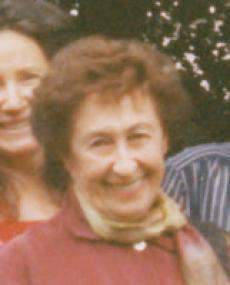
Ethel Walt Image source
Member of the Black Sash, founder of the Transvaal Rural Action Committee (TRAC) to fight forced removal
Ethel Walt was born on 22 November 1925 in Bothaville in the then Orange Free State (now Free State Province). Her family relocated to Yeoville, Johannesburg, Transvaal Province (now Gauteng), when she was still a young girl.
Walt could have easily chosen a comfortable life afforded to middle-class White South African women, settling for a life of leisure and privilege while ignoring the realities of apartheid. However, her courage and conviction forced her to move away from this comfort to fight against the injustices of apartheid. This would lead her to become the Transvaal chairperson of the Black Sash, a founding trustee of the Black Sash Trust, and the driving force behind the Transvaal Rural Action Committee (TRAC), an organisation committed to fighting against the apartheid government’s plans of forced removals.
In 1950, Walt moved to Cape Town, Cape Province (now Western Cape), where she married Alex Walt, whom she met while on holiday. There, she became a psychologist, practicing at the University of Cape Town’s Child Guidance Clinic until 1978, when she and her husband moved to Johannesburg. Walt continued her psychology practice, however, her interest in politics eventually drove her to give up psychology to devote herself fully to the Black Sash.
Much of Walt’s work was dedicated to the organisation’s ‘resettlement committee’ where she fought against the forced removal of whole communities under apartheid legislation. She fought for communities like Rooigrond in the former homeland of Bophuthatswana (now North West Province), who had already been moved from Machavistad, a village southwest of Johannesburg, in 1971, and were due to be moved again in 1982 to Bodibe, North West Province; Mathopestad, North West Province, where authorities attempted to get the people to move ‘voluntarily’; and Driefontein (later changed to Saul Mkhizeville, after the activist, Saul Mkhize, who was shot and killed in 1983 by a policeman for his activism against the forced removals), in the then Eastern Transvaal (now Mpumalanga Province), which was defined as a Black Spot that had to be moved.
Subsequently, it was recognised that a special committee was needed to address the issue of forced removals in the then Transvaal, resulting in the birth of the TRAC, with Walt playing a major role in its creation.
Accompanied by TRAC fieldworkers and carrying food and drinks to keep them sustained, Walt dedicatedly drove at all hours of the day and night to various places that were under threat of removal. She spent hours updating a previous Black Sash map showing threatened communities, meticulously drawing arrows from the areas that were in danger to the areas in the homelands that these communities were to be moved. This map was used to campaign against the forced removals as well as to educate people.
Thinking ahead of her time, Walt co-authored (with Gita Dyzenhaus) an article advocating a Bill of Rights for South Africa which was published in the Black Sash magazine in August 1980. In that same year, she protested alongside Jill Wentzel outside the Medical and Dental Council offices in Pretoria, Transvaal (now Gauteng), in response to the decision to drop the disciplinary charges in the death of Steve Biko. Facing a hostile public, they were eventually taken to the Bureau of State Security (BOSS) headquarters where they were questioned for an hour before being released.
In 1985, Walt became one of the founding trustees of the Black Sash’s Advice Office Trust, where she remained closely involved in its work and was an energetic and hard-working fund-raiser.
In 1991, eleven Black Sash members, including Walt (who was then 65 years old), were arrested after staging a placard demonstration in Bophuthatswana, in protest against the continued detention of political prisoners as well as the ban of the Black Sash in the homeland. Planning ahead, Walt had packed a toothbrush in case they got detained. After spending some time in the prison cells, the women were finally released after paying a R400 fine.
Walt committed herself wholly to the fight for human rights for all South Africans, remaining resolute in her belief that an equal South Africa would become a reality. She continued to work towards this ideal well into her later years.
Ethel Walt died on 3 June 2010 in Johannesburg, Gauteng, the result of injuries sustained in a car accident two weeks prior. Always a woman of action, when asked, once, why she hadn’t chosen an easier life, she said:
There’s no choice. You wake up and read the newspaper, and you have to act (Walt in Schwartz, 2010).
Walt is survived by her husband, three daughters, and five grandchildren.